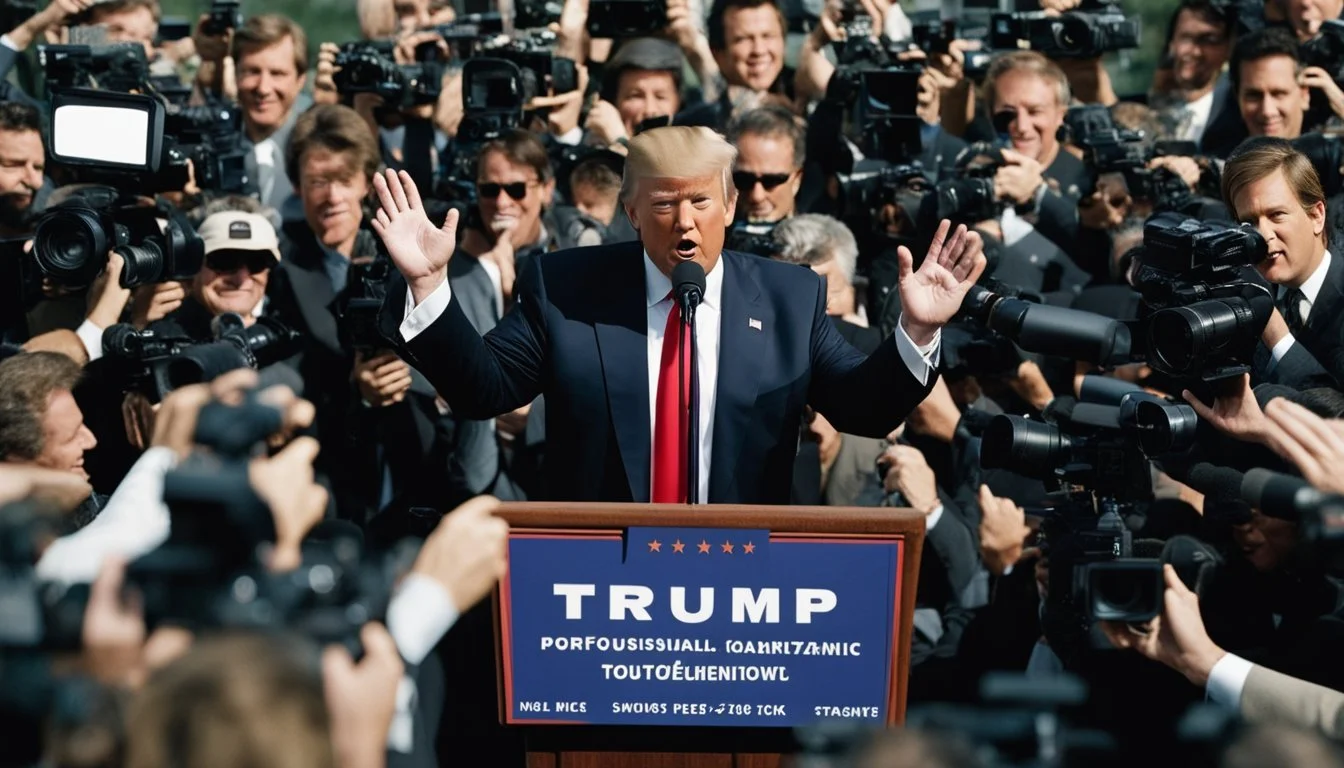Donald Trump Reinvents Himself as Reality TV Star in 2004
Reality TV Star's Political Aspirations Emerge
In 2004, Donald Trump was at a pivotal point in his career, straddling the worlds of business and entertainment. The New York real estate mogul had just launched his reality TV show "The Apprentice," which quickly became a hit and catapulted him to a new level of fame. Trump's political leanings during this period were less defined than in later years, as evidenced by his statement in a CNN interview that he "probably identified more as Democrat."
Trump's foray into television marked a significant shift in his public persona. "The Apprentice" showcased his business acumen and charisma to a wide audience, solidifying his status as a media personality. This exposure laid the groundwork for his future political ambitions, though at the time, Trump's political aspirations were not yet fully formed.
During this period, Trump also made notable comments about the economy, stating that it "does better under the Democrats than the Republicans." This remark, made two decades before his presidency, offers an intriguing glimpse into Trump's evolving political views and his willingness to cross party lines in his assessments.
Early Life and Business Career
Donald Trump's journey from a real estate scion to a prominent business figure and media personality spans decades. His early experiences and family background shaped his ambitious pursuits in New York City's competitive property market.
Family Background and Education
Donald John Trump was born on June 14, 1946, in Queens, New York City. His father, Fred Trump, was a successful real estate developer in New York. Trump attended the New York Military Academy as a teenager. He later studied at Fordham University for two years before transferring to the Wharton School at the University of Pennsylvania. In 1968, Trump graduated with a bachelor's degree in economics.
Real Estate Ventures and Expansion
Trump joined his father's company, then called Elizabeth Trump & Son, in 1971. He renamed it The Trump Organization in 1973. His first major Manhattan project was the renovation of the Commodore Hotel into the Grand Hyatt in 1976. Trump Tower, his signature skyscraper on Fifth Avenue, opened in 1983. It became both his residence and The Trump Organization's headquarters.
Public Persona and Branding
Trump's business approach emphasized branding and media attention. He authored books like "The Art of the Deal" (1987), which boosted his public profile. Trump owned the Miss Universe pageant from 1996 to 2015. His role as host of NBC's "The Apprentice" from 2004 further increased his celebrity status. This media presence helped promote his real estate ventures and other business interests, solidifying the Trump brand in popular culture.
The Apprentice and Media Exposure
Donald Trump's foray into reality television with "The Apprentice" marked a pivotal moment in his public persona. The show catapulted him to new levels of fame and significantly shaped his image in American culture.
Rise to Reality TV Fame
"The Apprentice" debuted on NBC in 2004, featuring Trump as the tough-talking boss. Contestants competed for a high-level job in one of Trump's companies. The show's catchphrase, "You're fired!", quickly became iconic.
Trump's boardroom scenes showcased his business acumen and decisive personality. The program attracted millions of viewers, making it one of NBC's highest-rated shows. It spawned several spin-offs, including "The Celebrity Apprentice" in 2008.
The success of "The Apprentice" led to numerous guest appearances on other TV shows and increased media coverage for Trump.
Impact on Trump's Public Image
"The Apprentice" significantly boosted Trump's celebrity status. It portrayed him as a savvy businessman and deal-maker, reinforcing his brand as a symbol of success and wealth.
The show allowed Trump to reach a broader audience beyond the business world. It presented him as a charismatic leader, capable of making tough decisions. This image would later play a role in his political aspirations.
Trump's increased visibility led to more speaking engagements and endorsement deals. His opinions on various topics gained more attention in the media.
Finances and Viewership
"The Apprentice" proved highly profitable for both Trump and NBC. Trump reportedly earned $375,000 per episode during the show's peak. The program's success contributed significantly to his net worth.
Initial seasons of "The Apprentice" drew impressive ratings. The first season finale attracted nearly 28 million viewers. While viewership declined in later seasons, it remained a solid performer for NBC.
The show's popularity led to lucrative product placement deals and spin-off merchandise. These additional revenue streams further enhanced the financial impact of the series for Trump and the network.
Political Landscape in 2004
The 2004 political landscape was marked by a contentious presidential election and shifting party dynamics. Donald Trump, though not directly involved in the campaign, made notable statements about the political climate.
Republican Party Dynamics
George W. Bush sought re-election as the Republican nominee in 2004. The party focused on national security issues in the wake of 9/11. Bush's campaign emphasized his leadership during the War on Terror.
The Republican platform supported tax cuts, traditional values, and a strong military presence abroad. Party unity was strong, with most Republicans rallying behind Bush's re-election bid.
Some fiscal conservatives expressed concerns about the growing national debt under Bush's administration. This created minor tensions within the party, though it did not significantly impact Bush's support base.
Public Political Statements
Donald Trump, then known primarily as a businessman and reality TV star, made several public comments about politics in 2004. In an interview with CNN's Wolf Blitzer, Trump said, "In many cases, I probably identify more as Democrat."
Trump praised the Democratic Party's economic policies, stating, "The economy does better under the Democrats than the Republicans." This statement contrasted with his later political alignment.
At the time, Trump was not affiliated with any political party. He had previously explored a presidential run with the Reform Party in 2000 but withdrew before the primaries.
Trump's 2004 comments reflected his fluid political views, which would evolve significantly over the next decade. His statements garnered attention due to his celebrity status but did not play a major role in the election.
Personal Life and Public Interest
Donald Trump's personal life and public persona intertwined significantly in 2004. His romantic relationships, family dynamics, and philanthropic activities drew considerable attention during this period.
Relationships and Marriages
In 2004, Donald Trump was engaged to Slovenian model Melania Knauss. The couple had been dating since 1998 and announced their engagement in April 2004. Trump's previous marriages to Ivana Trump and Marla Maples had ended in divorce.
Melania and Donald married on January 22, 2005, in a lavish ceremony in Palm Beach, Florida. Their son, Barron, was born in March 2006.
Trump's older children - Donald Jr., Ivanka, and Eric - from his first marriage to Ivana, were also in the public eye. They began taking on more prominent roles in their father's business empire.
Philanthropy and Social Positions
Trump's philanthropic activities in 2004 included donations to various causes. He contributed to healthcare initiatives and educational institutions. The Donald J. Trump Foundation, established in 1988, continued its operations during this time.
Trump's social positions often made headlines. He expressed views on political and economic issues, though he was not yet actively involved in politics. His wealth and business acumen remained central to his public image.
The Trump Organization expanded its real estate holdings and ventured into new business areas. This growth further solidified Trump's status as a prominent figure in American business and popular culture.
Publications and Literacy Contributions
Donald Trump's foray into publishing began in the 1980s, establishing him as a bestselling author. His books focused on business advice, real estate strategies, and personal branding.
The Art of the Deal and Beyond
Trump's literary journey started with "Trump: The Art of the Deal" in 1987. Co-written with journalist Tony Schwartz, it became a New York Times bestseller. The book blended autobiographical elements with business advice, showcasing Trump's negotiation tactics and deal-making philosophy.
Following this success, Trump authored several more books. "Trump: Surviving at the Top" (1990) and "Trump: The Art of the Comeback" (1997) continued his narrative of business triumphs. "The America We Deserve" (2000) marked his shift towards political commentary.
Trump's books often emphasized his personal brand. They featured his name prominently and reinforced his image as a successful businessman. These publications contributed to Trump's public persona and expanded his reach beyond real estate and television.
Legal and Ethical Controversies
Donald Trump faced numerous legal challenges and ethical concerns related to his business practices in 2004. These issues ranged from lawsuits over his casino operations to allegations of discriminatory behavior.
Business Litigations and Settlements
In 2004, Trump Hotels and Casino Resorts filed for bankruptcy, burdened with $1.8 billion in debt. This marked a significant legal and financial hurdle for the Trump Organization. The company emerged as Trump Entertainment Resorts after restructuring.
Trump was involved in over 4,000 legal cases throughout his business career. These included disputes with casino patrons, real estate lawsuits, and tax disagreements. Many of these cases resulted in settlements or judgments against Trump's companies.
The Trump Organization faced scrutiny over its financial practices. Allegations of tax evasion and fraudulent reporting plagued the company. These issues would continue to follow Trump in subsequent years.
Allegations of Discrimination
Trump's businesses faced accusations of discriminatory practices in 2004. Critics pointed to a history of alleged bias in his real estate dealings. These claims dated back to the 1970s when the Justice Department sued Trump Management for violating the Fair Housing Act.
Employees at Trump's casinos reported instances of racial discrimination. Some alleged they were removed from the casino floor when certain high-rollers arrived. These accusations added to the ethical concerns surrounding Trump's business operations.
Trump denied all allegations of discrimination. He maintained that his companies provided equal opportunities to all employees and customers. Despite his denials, these controversies continued to impact his public image.
Cultural and Social Influence
Donald Trump's impact on American culture and society in 2004 was significant. His celebrity status and business persona shaped public perceptions and media narratives. Trump's influence extended beyond business into popular culture and entertainment.
Influence on Popular Culture
Trump's brash persona and catchphrases permeated popular culture in 2004. "You're fired!" from The Apprentice became a widely recognized slogan. His distinct hairstyle and mannerisms were frequently parodied on comedy shows and in casual conversations.
Trump's wealth and lifestyle fascinated many Americans. His luxury properties and high-profile romantic relationships fueled gossip columns and tabloid coverage. This media attention reinforced Trump's image as a symbol of success and extravagance.
The Trump brand expanded into various consumer products. Trump-branded items like ties, fragrances, and even steaks appeared in stores. These products capitalized on his growing fame and business reputation.
Public Opinion and Reception
Public perception of Trump in 2004 was mixed but trended positively. Many viewed him as a successful businessman and shrewd dealmaker. His confident demeanor and promises of sharing secrets to wealth appealed to aspiring entrepreneurs.
Trump's outspoken nature and controversial statements garnered both admirers and critics. Some praised his bluntness as refreshing honesty. Others found his comments offensive or unprofessional.
Polls showed Trump's name recognition increasing significantly due to The Apprentice. The show improved public opinion of his business acumen and leadership skills among viewers.
Appearances in Media
The Apprentice dominated Trump's media presence in 2004. The reality show averaged 20.7 million viewers in its first season, ranking 7th overall. Trump's role as the stern but fair boss resonated with audiences.
Trump made frequent talk show appearances to promote The Apprentice and his other ventures. He was a regular guest on late-night programs and daytime talk shows. These appearances allowed Trump to showcase his charisma and business knowledge.
Print media also featured Trump prominently. Business magazines sought his commentary on economic issues. Lifestyle publications highlighted his properties and personal life. This media exposure further cemented Trump's status as a celebrity businessman.
Financial Disclosures and Wealth
Donald Trump's financial disclosures and wealth have been subjects of intense scrutiny and debate. His business holdings span various industries, with real estate forming the core of his portfolio.
Net Worth and Business Holdings
Forbes estimates Donald Trump's net worth at $4.1 billion as of August 2024. This figure contrasts with Trump's own higher claims about his wealth. The Trump Organization, his primary business entity, encompasses a wide range of properties and ventures.
Trump's portfolio includes hotels, golf courses, and residential buildings across multiple countries. Notable properties like Trump Tower in New York and Mar-a-Lago in Florida contribute significantly to his asset base.
Recent financial disclosures reveal that over 100 of Trump's companies generate no income. This information sheds light on the complex structure of his business empire.
Income Sources and Dealings
Trump's income sources are diverse, spanning real estate, licensing deals, and entertainment ventures. His financial disclosures indicate earnings from various Trump-branded properties and golf courses.
A notable recent income source is CIC Digital LLC, created for Trump's NFT (non-fungible token) project. This venture reportedly generated between $100,001 and $1 million in income.
Trump's financial dealings also include substantial liabilities. Reports suggest he owes more than $100 million related to legal troubles in New York.
His wealth has roots in his father's real estate business. Trump received gifts, loans, and inheritance from his father, which helped launch his own business career.









